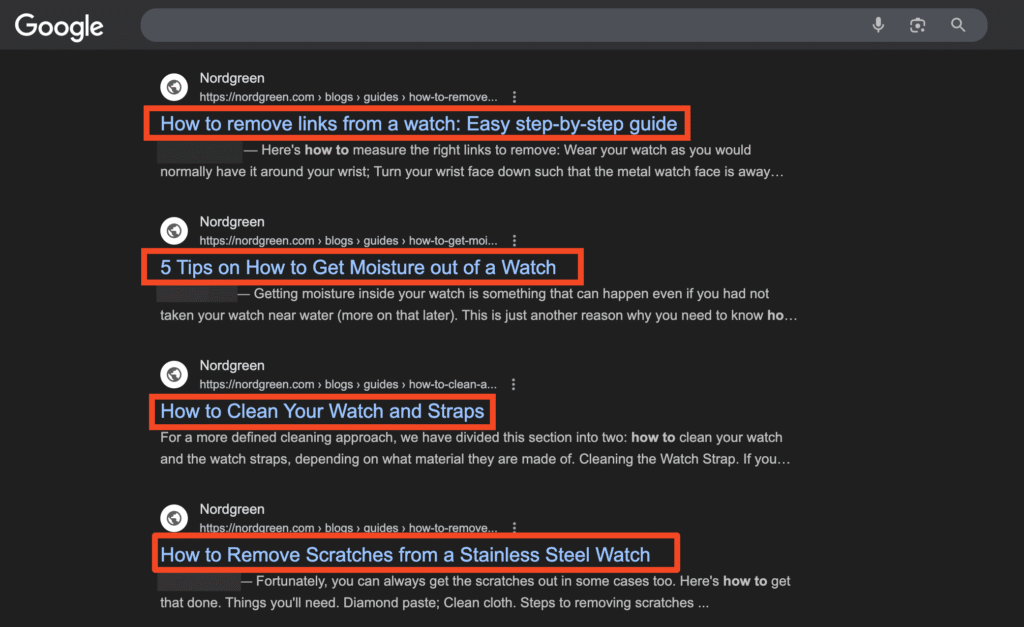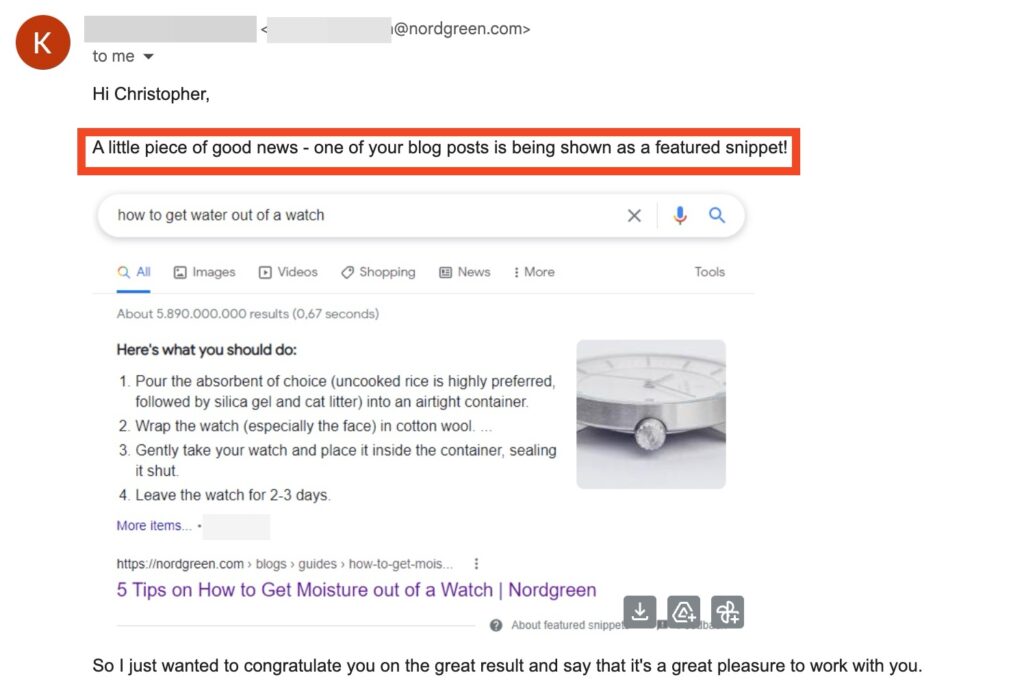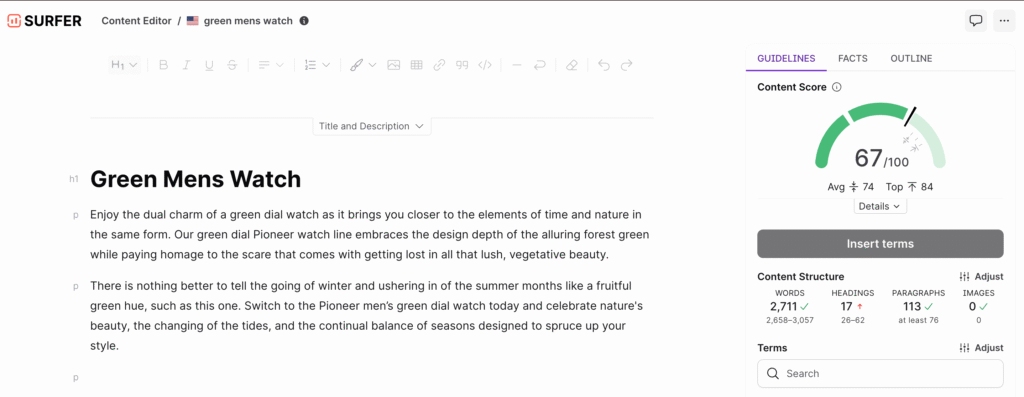I’ve always maintained that Search Engine Optimization (SEO) isn’t just a bunch of tricks that help you rank high in search engines. Instead, it’s a tool that can be engineered to solve different goals: increasing your leads, improving revenue, advancing brand visibility, and more.
That was what I helped do for Nordgreen: solve business problems with SEO.
The Nordgreen problem
Nordgreen was one of the fastest-growing fashion startups in Denmark. When it became time to expand into new markets, especially the U.S., Canada, and the U.K., Nordgreen turned to SEO, among other approaches.
Spoiler alert: it worked, even better than was expected.
But how did it work? What was the approach? What tools did we use? And what challenges did we face? I’ll share them all in the rest of this case study.
The strategy
One mistake to avoid in SEO is applying a one-size-fits-all strategy to all projects. Of course, the SEO basics often remain, but how you pivot them is crucial to the end goal.
For instance, in this case, Nordgreen wasn’t looking to generate leads, nor was it interested in simply getting impressions. Instead, the brand wanted to break into new markets, gain awareness, and start making sales.
Therefore, the SEO strategy used here focused on three things:
- Awareness
- Brand recognition
- Sales
How did we create awareness?
Simple: by being helpful.
We focused the SEO content research and creation around helpful content.
Most of the big fashion brands in the wrustwatch space focused on their new collections, seasonal launches, press releases, and other serious business. This left most watch users and enthusiasts without much help or support.
So, we redefined that.
Rather than focusing on Nordgreen watches alone, we created helpful content that cut across manufacturers. Whether you were looking for how to clean a watch, manage a mechanical dial, repair a damaged watch strap, or anything else, you could come to Nordgreen.

Soon enough, that brought in the traffic, and from the regions (U.S., Canada, and the UK) we were targeting. In fact, the helpful content was so good that it brought in traffic from other regions, too.
Then came brand recognition
We did something neat and creative in the awareness stage above that resonated with brand recognition.
Like I said, the helpful content wasn’t designed around Nordgreen watches alone. After all, at the time we started, maybe only a handful of people were searching for things like “how to clean a Nordgreen watch.” However, tons of people were searching for “How to clean a watch.”
So, how to brand that? Easy!
Once we’ve reeled the audience in with the helpful content, we can deliver the brand message around the article. This was done in a variety of ways, which you can replicate:
- Logo: Without a brand logo, site visitors will come and not remember you.
- Custom visuals: Add your brand’s signature to helpful (and shareable) media (video or images) to be published alongside your content.
- Weave-ins: We wove in a Nordgreen-specific offering, in a non-salesy way, around every article. For example, it’s easy to recommend Nordgreen’s straps (and they were unique!) to an audience that’s already researching “How to choose the right replacement strap.”

This, combined with other communication efforts such as Nordgreen’s partnership with influencers, boosted brand recognition.
Sales: How does SEO make it happen?
First, we looked for angles in the helpful content where we could recommend products to users. Concerned about finding the next best watch strap, for example? We just redirect the reader to our watch strap collection pages.
Then came the collection pages, which are the heart of any e-commerce SEO campaign. I see a lot of SEO strategies focusing on individual review pages instead, but that might not help you scale as fast as collection pages.
Why?
- If you sell seasonal products (including tech products, such as laptops and phones), you’ll constantly have to produce new review pages whenever a new product launches.
- The strategy behind single review pages assumes that the reader already knows what they want (bottom of the funnel). Most readers are still shopping for options (middle of the funnel).
- Collection pages can easily be changed and updated en masse, allowing you to scale rapidly. For instance, “Best X of 202X” can easily be changed to “Best Y of 202Y” with new recommendations. You can’t do the same for review pages.
- Collection pages allow you to meet multiple user needs at once. Someone looking for the “best budget X,” “best X for adults,” “best X for Y,” and other variations can find them all in one single collection page.
Now that we’ve established that, you can see why it was the natural next step for us to take (and why that strategy worked)!
The technical SEO side
Still here? Let’s get a bit technical with software, tools, and stuff.

SEO isn’t magic (just strategies), but if it were, you’d need some wands. Here are some of the SEO wands we used on this project:
- Spreadsheets: I’ve never run an SEO campaign without spreadsheets. From initial keyword research to keyword rank tracking and content calendar mapping, spreadsheets are king.
- Keyword research tools: Semrush was key for us in this project, thanks to its massive database of underutilized and often overlooked keywords.
- Competitor analysis: Semrush filled in the gap here, as well. It’s incredibly impressive the insights you can get on your target market (and existing competition) with this tool. Of course, you’d need to know what you’re looking for and how to discard the data that doesn’t matter.
- Content calendar: Otherwise, we’d just be publishing content based on vibes. Instead, you want to map your content writing strategy such that it aligns with the keywords and helps you dominate every topic you pick (for topical authority).
- SurferSEO: SurferSEO is crucial for fast, artificial intelligence-driven insights that help create content structure. That’ll ensure you’re not just writing content, but you’re creating value.
As I’ve always maintained, the greatest SEO tool is your mind. So, never trust any software 100%. Instead, take their recommendations and apply your own expertise to make the best overall strategy.
Bottom line
It needs saying once again that SEO doesn’t just serve to generate traffic, bring in leads, increase revenue, or anything else. Instead, it helps to solve your business problems, which could be one or a combination of the different SEO applications.
Once you approach it that way, it opens up a new world of possibilities and strategies to you, as it did with Nordgreen.
Ready to solve business problems with SEO, too? Send me a message today, let’s talk!

Leave a Reply